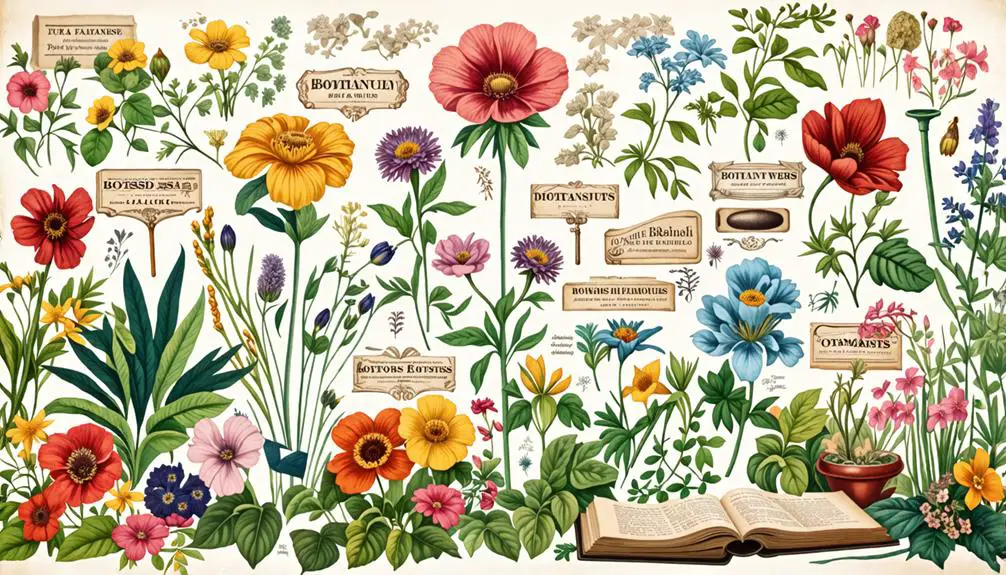Baby Names Inspired by Famous Botanists
If you’re looking for baby names inspired by famous botanists, you’re in for a treat! Consider names like Linnaeus, the father of taxonomy, or Darwin, which invokes adventure in nature.
For girls, Linnaea, linked to Carl Linnaeus, offers a beautiful botanical touch, while Agnes celebrates purity as an homage to Agnes Arber.
Gender-neutral options like Aspen and Clover bring a whimsical twist. Names like Humboldt and Banks honor significant contributions to plant exploration. Each name carries a story, blending nature with legacy. Stick around to uncover even more fascinating botanical inspirations for your little one!
Plant Names for Boys

If you’re looking for a unique and meaningful name for your baby boy, consider plant names inspired by famous botanists that celebrate nature and discovery.
Names like ‘Linnaeus’ honor the father of modern taxonomy, reflecting a rich heritage in botanical classification.
‘Darwin’ evokes exploration and adventure, reminding us of natural selection’s role in plant evolution.
‘Banks’ pays tribute to Joseph Banks, known for his adventurous spirit in exploring Australia’s flora.
For a connection to environmental science, ‘Humboldt’ represents the intricate relationships within ecosystems.
Finally, ‘Hooker’ reflects a legacy of plant exploration and ecology.
Each name not only carries a significant story but also embodies a love for nature and the excitement of discovery.
Plant Names for Girls
Consider choosing a plant name for your baby girl that honors the contributions of renowned botanists while celebrating the beauty of nature.
Names like Agnes reflect purity and simplicity, inspired by botanist Agnes Arber‘s work on plant morphology.
You might like Darwen, an adaptation of Darwin, symbolizing curiosity and exploration.
Linnaea, named after Carl Linnaeus, connects to the twinflower and highlights the importance of botanical classification.
Caroline, inspired by Caroline Herschel, signifies strength and resilience, much like enduring plants.
Finally, Cecilia, linked to botanist Cecilia Payne-Gaposchkin, embodies grace and elegance, mirroring the delicate nature of flowers.
These botanical names for girls not only showcase nature’s beauty but also pay tribute to influential figures in botany.
Gender-Neutral Plant Names

Exploring nature-inspired names for your child can lead you to beautiful gender-neutral options that celebrate the wonders of the botanical world. Names like Aspen, Clover, and Fern not only evoke the essence of nature but also defy traditional gender norms, making them perfect for any child.
Aspen symbolizes strength and adaptability, while Clover offers a hint of whimsy and luck. Rue, known for its culinary and medicinal uses, stands out as a unique choice.
Additionally, Oakley and Briar reflect the growing trend toward inclusivity in naming practices. These gender-neutral plant names beautifully capture the spirit of the natural world while embracing diversity, allowing you to choose a name that resonates with your family’s values.
Unique and Rare Names
Unique and rare names inspired by renowned botanists offer a distinctive way to connect your child to the beauty of the natural world.
Consider naming your child Linnaeus, honoring the father of modern taxonomy, or Darwin, a name symbolizing exploration and discovery in natural sciences.
Banks captures the adventurous spirit of Joseph Banks, who traveled the world documenting botanical wonders, while Huxley brings a literary touch with its botanical roots.
Humboldt, inspired by Alexander von Humboldt, embodies intellectual curiosity and a deep appreciation for nature.
Each of these names is unique and rare, allowing your child to carry a legacy of exploration, classification, and a profound connection to the environment.
Embrace these distinctive names to celebrate nature’s beauty!
Historical Context of Plant Names

Names inspired by botanists like Linnaeus not only celebrate nature but also reflect a rich historical context that informs how plants are classified and understood. The development of binomial nomenclature by Carl Linnaeus transformed plant classification, establishing a standardized approach through his influential work, *Species Plantarum*. This system laid the groundwork for modern taxonomy, emphasizing hierarchical classification that enhances our understanding of biodiversity.
Here are four key aspects of this historical context:
- Standardization: Scientific names provide consistency across languages and regions.
- Organization: Hierarchical classification groups plants based on shared traits.
- Recognition: Linnaeus’s work formally classified over 5,000 species.
- Connection: Historical naming conventions often reflect cultural meanings and plant origins.
Cultural Significance of Botanical Names
Botanical names carry deep cultural significance, often reflecting the heritage and values of the communities that cherish them. These names are rooted in ancient languages, conveying symbolic meanings tied to plant characteristics and uses.
Different cultures express their cultural heritage through naming practices, attributing various emotional resonance to specific plants. For instance, a flower might symbolize love in one region while representing resilience in another.
Regional variations showcase the diversity of languages and highlight how local flora shapes cultural identity. Ultimately, botanical names encapsulate themes of love, purity, and other virtues, serving as a bridge between nature and cultural values, enriching the tapestry of human experience.
Conclusion
In choosing a name inspired by famous botanists, you’re not just picking a title; you’re planting a seed of inspiration for your child’s future.
Each name carries a story, a legacy rooted in nature’s beauty.
Whether it’s a strong boy’s name or a delicate girl’s name, you’re celebrating the wonders of the natural world.
Let these botanical names bloom in your hearts, cultivating a deep appreciation for both science and nature as your child grows.







